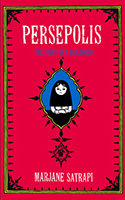Response to Removal of Persepolis from Chicago Classrooms Grows
The National Coalition Against Censorship, on behalf of the Kids’ Right to Read Project, has come out in strong opposition to the Chicago Public School system’s decision to remove the graphic novel Persepolis by Marjane Satrapi from certain district classrooms.
The National Coalition Against Censorship (NCAC), on behalf of the Kids’ Right to Read Project, has come out in strong opposition to the Chicago Public School (CPS) system’s decision to remove the graphic novel Persepolis by Marjane Satrapi from certain district classrooms.
(NCAC), on behalf of the Kids’ Right to Read Project, has come out in strong opposition to the Chicago Public School (CPS) system’s decision to remove the graphic novel Persepolis by Marjane Satrapi from certain district classrooms.
Chicago Public School’s CEO Barbara Byrd-Bennett sent a notice to system principals on March 15 asking for Satrapi’s books to be pulled from seventh grade classrooms and to halt any teachings about it for those students. Byrd-Bennett said the title may be appropriate for junior, senior, and advanced classes, but CPS wanted to develop a training guide for teachers before going forward. In addition, the district would consider allowing teachers to use the book in eighth to tenth grades.
In removing Persepolis from seventh grade classrooms, CPS cited the title’s “graphic language and images that are not appropriate for general use in the seventh grade curriculum.”
NCAC responded with a letter to the school district that asked CPS to reconsider its decision. The letter noted that the main character’s middle-school age would make for a very relevant read for seventh grade students, and that “the vast majority of Chicago middle school students are surely aware of the reality of violence and its devastating effects on people of all ages. Most have witnessed it on the news, if not in their own neighborhoods.” The letter was signed by representatives from the Comic Book Legal Defense Fund, the American Booksellers Foundation for Free Expression, the Freedom to Write and International Programs of PEN American Center, the Free Expression Advocacy Division of the Association of American Publishers, and the National Council of Teachers of English.
The book’s publisher, Pantheon (an imprint of the Knopf Doubleday Publishing Group), also joined in with a statement explaining how the book has been taught in a number of schools and has had the in-person involvement of the author in the education of these students, with no negative issues to speak of. They called the removal of the book “censorship.”
NCAC received a response to its letter to CPS on March 20. Lee Ann Lowder, deputy general counsel of the Board of Education of the City of Chicago, cited the case of Zykan vs. Warsaw Community School Corporation, in which the Circuit Court of Appeals determined that “a high school student’s lack of the intellectual skills necessary for taking full advantage of the marketplace of ideas engenders a correspondingly greater need for direction and guidance from those better equipped by experience and reflection to make critical educational choices.” Lowder also stated that the Board disagreed with NCAC’s assessment that the removal of the book violates the First Amendment. Lowder concluded, “CPS administrators will consider your objections as they decide whether and how Persepolis will be used in eighth through tenth grade curricula.”
Acacia O’Connor, the coordinator for the Kids’ Right to Read Project and NCAC, told BTW that the groups would continue “looking into CPS policies when it comes to removing materials from classrooms,” including the legal precedents CPS is relying on in its defense.
Barbara Jones, director of the ALA Office for Intellectual Freedom and the executive director of the Freedom to Read Foundation said in a letter to CPS: “Censorship results in the opposite of true education and learning. Young people will only develop the skills they need to analyze information and make choices among a wide variety of competing sources if they are permitted to read books and explore ideas under the guidance of caring adults. As an institution of democracy and learning, CPS has a responsibility to actively model and practice the ideals of free speech, free thought, and access to information at the heart of our democracy.”
The Chicago Tribune reported that the ALA, in its years of record-keeping on books stirring up controversy, has never had an issue come up about Persepolis.
On the Chicago home front, approximately 75 students, parents, and teachers rallied after school on March 15 to protest the removal of Persopolis. Students attempted to stage a sit-in the morning of March 18, but it was swiftly broken up.
The controversy has also boosted sales of the title in a number of area bookstores. Time Out Chicago Kids reported empty shelves at Women & Children First in Andersonville, The Book Cellar in Lincoln Square, Unabridged Bookstore in Lakeview, and Sandmeyer’s Bookstore in Printers Row.
Persepolis, which was named as one of the best comic books of 2003 by TIME magazine, and the film of which was nominated for an Academy Award in 2007, is a coming-of-age tale following the life of author Satrapi as she experiences the cultural revolutions of Iran. Many of the themes in the book involve freedom of expression, freedom of ideas, and freedom of person. Satrapi herself commented on the controversy in the Chicago Tribune, saying, “It’s shameful. I cannot believe something like this can happen in the United States of America.”